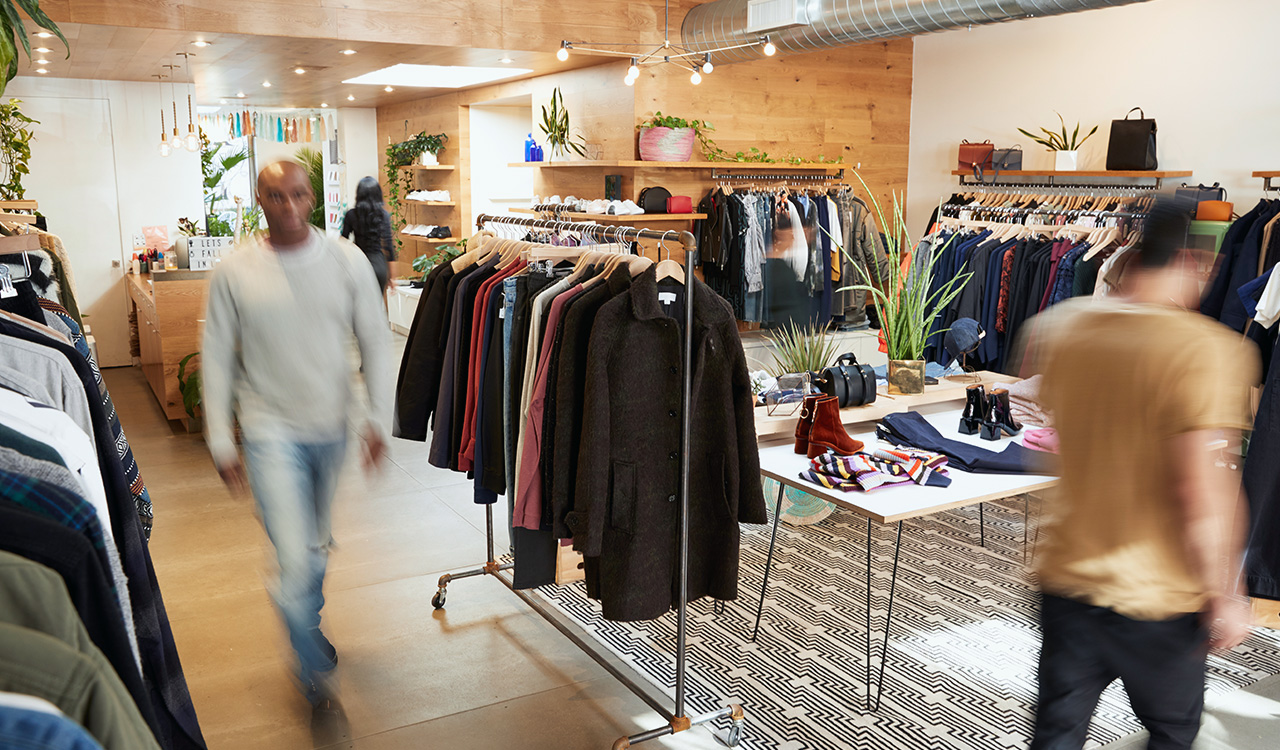To kick off retail’s transformative year, NRF was a one-stop shopping moment to take the pulse of the industry. If a meme is an idea or behavior that spreads by imitation or repetition, the meme for NRF was artificial intelligence. Whether generative, intuitive, or exploitative, AI was the event’s prevailing undercurrent.
AI applications are a powerful reminder that disruption is not necessarily bad. Any major technology breakthrough responds to systemic change in how we do business. Think Perceptive AI, Consumer Guardianship and Eco-Stewardship, all of which are strengthened by emerging tech innovations.
Case in point? Google’s Managing Director of Strategic Consumer Industries in Retail, Amy Eichliman, shared survey results reporting that 81 percent of retailers feel an urgency to adopt generative AI.
But watch out for those shiny new toys. Red flags caution AI hype and useless applications of novel technology. Columbus Consulting CEO Jon Beck commented, “There are huge opportunities in AI and other new technologies for companies, different ways to communicate with customers, aligning their business to be better, and have fewer silos. Everyone wants end-to-end integration, but it all comes down to their data. If they don’t have clean comprehensive data, they can’t just paste the latest technology on top of it and expect it to transform their operations.” Columbus Partner Richard Pedott added, “You can’t turbo charge on a weak foundation”.
Simply stated, AI infusion is retail’s future. But of course, it’s more complicated than that. AI and retail tech may be the infrastructure, but there are some macro shifts guiding the retail industry with alternative innovations and countercurrents shaping the evolving retail environment. These trends beg for a different mindset and an understanding of how AI can augment intelligence and deliver a better customer experience. We’ve identified three major trends to watch and act on.
Trend #1: Perceptive AI
In Q3 2022 when Chat GPT, DALL-E-2, and Mid Journey were unleashed, the world was momentarily stunned, but early adopters quickly started playing with the new toys. Simultaneously, technology giants Google, Microsoft, Meta, Nvidia, et al. developed competitive models. Developers recognized the immense opportunity on the horizon and by early 2023, robust AI applications emerged. Within six months, a myriad of next-generation, perceptive AI-infused retail tools were rolling out.
W-AI-lmart
Walmart’s COO of Global Technology Anshu Bhardwaj stated that Walmart’s investment in long-term customer solutions, many grounded in AI, is transforming the company moving beyond omnichannel into a new model she called Adaptive Retail. Adaptive retail is the integration of large language models and retail systems to facilitate a next-level experience for the consumer. Among the recent innovations, Walmart’s upgraded Text to Shop app allows Walmart+ customers to access the full Walmart catalog, order in context, and manage auto-replenishment. Rebooted Ask Sam is the company’s retooled voice assistant for in-store retail associates. Associates are outfitted with the upgraded app now offering real-time, information on prices, inventory, and item location. It also allows associates to put requested items on hold until customers retrieve the items. And Me@campus is a generative AI, inter-office toolkit supporting corporate teams in summarizing proprietary documents, allowing office staff to “focus on the tasks that are distinctly human, like generating new ideas, crafting strategy and building relationships.”
Macy’s + Tractor Supply
Macy’s CFO and COO Adrian Mitchell explained that Macy’s has employed AI for pricing science and inventory allocation. Tractor Supply Company’s CEO Hal Lawton added that AI applications drive the company’s supply chain, inventory management, customer service, and marketing copy.
Emerging Tech
There is no shortage of AI tech entrepreneurs with solutions looking for problems. It takes patience to weed through the legions of clever innovations with increasingly odder-sounding names. However, when it comes to perceptive AI, we found three interesting startup applications. Cimulate addresses customer intent with a GenAI model trained on the corpus of consumer search terms and data. Selectika uses AI tagging to holistically analyze trends, inventory management, and customer personalization for both B2B and B2C. Psykhe AI develops a psychological consumer profile to create predictive product targeting powered by personal shopping data.
Trend #2: Consumer Guardianship
While a circular retail environment is nascent in the U.S., it is a top priority in the EU. The concept of Consumer Guardianship has emerged as consumers discover the economic advantages of buying better goods and keeping them in good condition — treating them as assets rather than something expendable. Futures consultant Kate Anketill described Consumer Guardianship as an emergent relationship between consumers and their purchased goods driven by rising consumer costs, as well as ethical and ecological concerns. Legislation that supports the circular cycle includes the EU’s digital product passport requirements that roll out in 2026. The passports verify authenticity, origin information, age of the item, and additional data advantageous to resale. France’s anti-waste law, aimed at reducing apparel waste has been implemented and Right to Repair legislation is enacted in some states and jurisdictions within the U.S.
In short, Consumer Guardianship advocates the end of unconsidered mass consumption; an asset mindset with consumers as guardians of the stuff that they own; and conservation with consumers taking care of their assets so they retain value before putting them back into a circular economy.
Houdini
Houdini is a Swedish sportswear and lifestyle brand that promotes an extended product lifecycle. Its Houdini Circle allows customers to buy pre-owned products in-store, repairs previous purchases, and has a digital resale platform.
Reformation
Hali Borenstein, CEO of U.S.-based cult brand Reformation introduced the brand’s buy-back program RefRecycle. The project’s mission is to promote the practices of “Rewear, Resell, Recycle, and Repair,” giving the customer an economic advantage within the product lifecycle.
Guardianship Tech
Emerging retail tech is on the Guardianship pathway. Arianee makes digital product passports and engagement tokens; Solaire also makes digital product passports connected to blockchain that interface with popular resale platforms; Avery Dennison is the innovator in RFID technology; Temera makes NFC chips (near-field-communication chips that are in all credit cards) for handbags or clothing to verify authenticity or product information, and Treet has developed resale software for brands to embed on their sites.
Trend #3: Eco-Stewardship
Climate change isn’t just a headline that can be ignored. Andrea Bell, VP of Consumer Insights at WGSN emphasized that soon deprioritizing the environment will no longer be an option. She emphasized that governments in Europe are now encouraging Eco-Stewardship through degrowth and product sustainability. Although this trend is driven by ecological concerns it can also pay off economically. For example, in the EU, there are French subsidies for shoe and apparel repair costs.
This membership-model consumer platform is described by Vogue as the world’s first De-Growth brand. The WGSN STEPIC report 2024 adds, “Early Majority runs a membership program offering product swaps, made-to-measure garments and more. Lifetime membership costs $358, and its goal is to eventually close down non-member sales completely.”
Apparel brand Toward aims to discourage overconsumption by capping customer purchases at 12 orders per year. The company’s goal is to reduce overall consumer waste.
Walmart
EVP of Supply Chain at Walmart Dave Guggina described the company’s new automated storage and retrieval facility. He says Walmart’s process “marries” the right size containers and boxes exactly to the individual customer order.” It is an innovation that blends personalization and sustainability.
Vusion is a global leader with in-store, visual data and tagging technology. Philippe Bottine, CEO of North America explained that European retail leaders take the 2025 sustainability goals seriously. “In meetings, sustainability is the first question they ask about. It is the top priority.” In response, Vusion developed a battery-less (greatly reduced battery dependence) technology called shelf-edge to reduce battery use required for in-store and dynamic displays. Charlotte Kula-Przezwanski, Partner/EMEA Lead at Columbus adds, “In Europe, we are ahead on ESG. Traceability is a priority not only for the brands but for consumers. They are interested in green credentials. In France, now you have to prove you have these credentials. All the technology like digital product passports, product lifecycle management, even tagging with NFC and RFID are taken very seriously.”
Brainbox AI introduced an AI-powered analytics tool that worked to decarbonize retail operations by measuring, reducing outputs, and utilizing offsets for ecological benefit.
AI Promise
When you aggregate these three macro trends, the future of retail feels full of promise. The world writ large is processing the hope, hype, and peril of accessible artificial intelligence. AI has unlocked a new spirit of ingenuity offering promise to an industry buffeted by more than a decade of disruption.
AI applications are a powerful reminder that disruption is not necessarily bad. Any major technology breakthrough responds to systemic change in how we do business. Think Perceptive AI, Consumer Guardianship and Eco-Stewardship, all of which are strengthened by tech innovations.
Retail appears ready to cross the Rubicon in a transformative moment moving beyond omnichannel to the next paradigm. AI will be there in lockstep accelerating the march forward.




